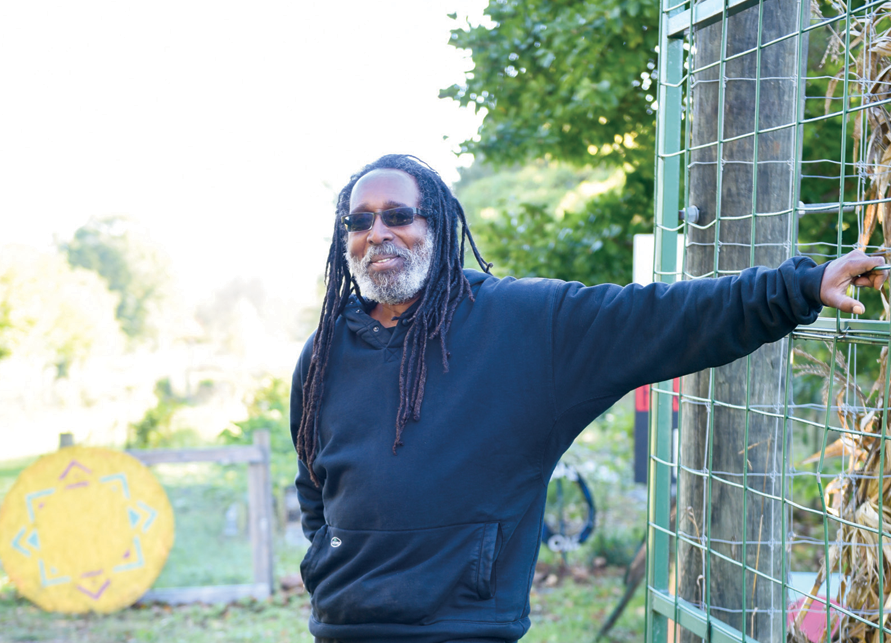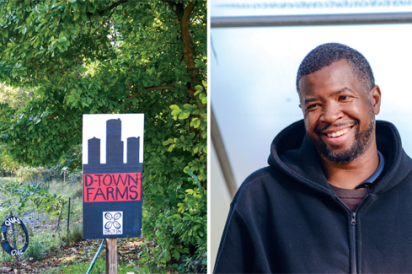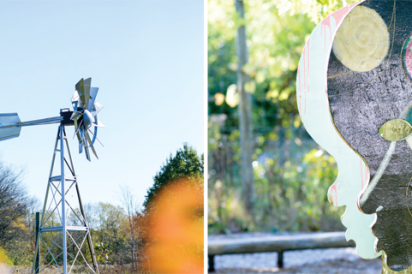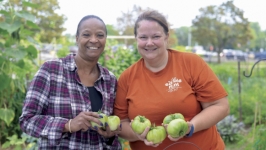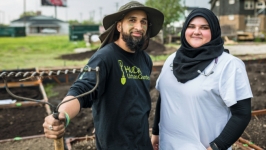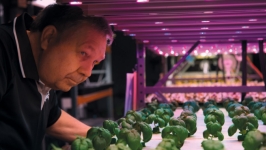D-Town Farm Soldiers On
For Karanji Kaduma, volunteering at D-Town Farm in Detroit’s Rouge Park isn’t solely about growing healthy food. It’s also about nurturing community.
“I love my people and my community. I love food justice and I love being part of the solution, unapologetically,” says the first-year volunteer. “And I love the environment. My degree is in environmental science.”
As a late October sky unfolds, D-Town farm’s most prolific vegetables are already well harvested. Only scattered vegetables remain: a smattering of enthusiastic Swiss chard and collard greens, turnips and ground cherries that could knock your socks off. The brisk autumn morning silently sounds the alarm of the approaching winter. Within a month, the farm takes its winter break until mid-March. It’s the rare time of year when those who run the farm can slow some to speak with curious visitors.
At first glance, not all that much about D-Town differs since EdibleWOW visited the farm in 2011. Started in 2006 by the Detroit Black Community Food Security Network (DBCFSN) to address the city’s food accessibility crisis, the farm soldiers on. Birds still chirp in harmony with the whirr of cars on nearby Outer Drive. A jet overhead makes its approach to nearby Metro Airport.
DBCFSN Executive Director Malik Yakini just returned from New Hampshire, where he delivered the keynote address at Dartmouth University’s Food Day, a global event dedicated to nutrition, agriculture and hunger.
“It gives me a broader perspective. I share what we do. I pick up new stuff and everybody’s enhanced, hopefully,” says Yakini moments before he greets roughly two dozen Kellogg food system grantees at a scheduled D-Town farm tour. The group includes farm folks from North Carolina to Arkansas, Mississippi to Minnesota, some of whom Yakini met at past conferences. He explains how D-Town had two other temporary locations before negotiations to move to Rouge Park began in 2006.
“We were kinda like guerrilla gardeners,” Yakini says. “We were farmers with no place to farm.”
That changed in May 2008, when the city suggested the group look at Rouge Park’s old tree nursery to see if that might work. It did. By 2010 two acres grew to roughly seven, becoming what Yakini believes is Detroit’s largest contiguous agricultural entity.
“It doesn’t mean we’re better. It means we have more work than anybody else,” he says wryly.
In 2017 D-Town supplied food regularly to the Live6 Market on the Ave and Eastern Market on Tuesdays as well as at the farm on weekend mornings. They also sold wholesale to a few Detroit restaurants, including Sister Pie and Detroit Vegan Soul.
That alone doesn’t remedy Detroit’s food-access problems. Nor do the additions of the midtown Whole Foods and a Meijer store that moved to the city. Though it certainly helps some segments of the population, says Yakini, many Detroiters still have a proximity problem with regards to reaching good food, plus about 33% live below the poverty level, he says.
“That puts many Detroiters in dire need of better options for high-quality foods,” he says.
As the tour continues, grantees quiz Yakini about farm practices, including whether it’s organic. He says they use organic practices, but eschew the “mountain of paperwork,” as he calls it, required to be certified, and talks about a few of the solutions the farm found for other challenges, namely utilities.
For water, the farm started as basically a bucket brigade in its first year to having a rainwater retention pond with two water towers that gravity-feed 40,000 gallons of water to a drip irrigation system in 2015.
“It reduces our dependence on city water,” says Yakini. “It’s also a water conservation technique. The whole farm is a permeable surface. We’re contributing to that more by capturing the rainwater and it’s easing the strain on the city storm water management systems.”
DBCFSN added much-needed power the farm by providing eight kilowatts of solar energy, roughly enough to run two houses, says Yakini. The panels, which generate 3,000 watts per hour, are housed in a donated shipping container. D-Town still needs to find a way to better disperse the electricity and hopes to come up with plans for trenching it.
The farm also had an issue many might not expect on an urban farm. The Rouge River location comes with a herd of roughly 700 deer, says Yakini, plus a host of the usual suspects that damage plants at their tenderest: rabbits and groundhogs.
“We’re almost in a nature preserve here. We have to pay much more attention to animals than most urban farms do,” says Yakini, describing the park’s deer as “bold ghetto deer” who do not scare easily. DBCFSN fenced in the perimeter of the farm. “It was an expensive proposition, but we solved the deer problem.”
Yakini reminds how D-Town models a grassroots example of a community collectively working together to implement a project that is about greater good. It isn’t just about the growth of the plants on the farm, but about the growth of the sense of community where people work together cooperatively, safe from the aggression that people of color experience daily, whether from someone’s body language or the tone of a voice, he explains.
“D-Town Farm is a place where people can breathe, free of all of these kinds of energy,” Yakini says. D-Town represents a microcosm of the solution, adds Kaduma, calling the farm a place to find peace: “Cultivating crops to feed our community—that in itself is liberating. Relying on ourselves to eat, drink and breathe.”
Learn more at Detroit Black Food Security Network.


